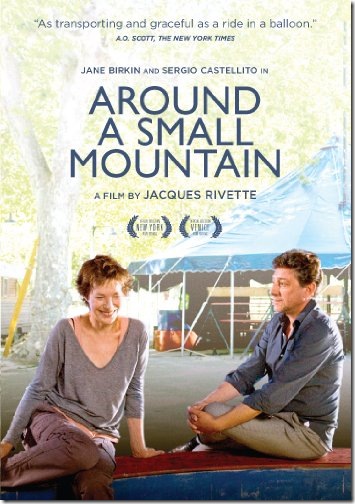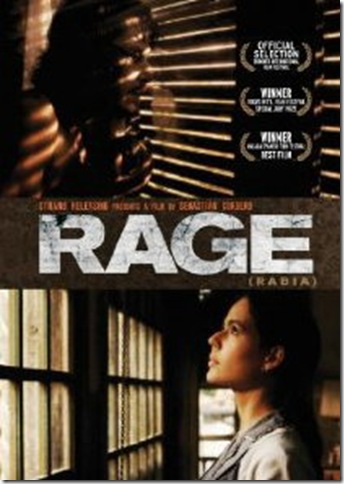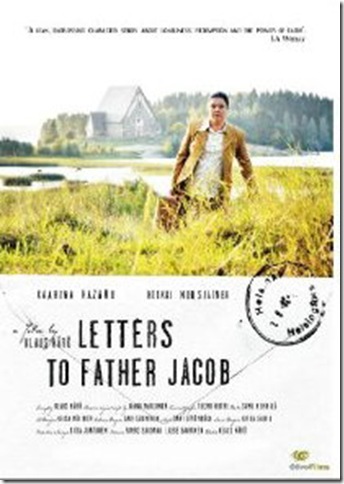Around a Small Mountain (Cinema Guild)
Release date: March 8
Standard list price: $26.99
Could it be that French director Jacques Rivette, the New Wave lion who just turned 83, is finally slowing down? What else can we make of the fact that his latest feature, which could very well be his last, is a scant 84 minutes? For Rivette, Around a Small Mountain is the equivalent of most directors’ short films. His leanest titles usually come in around 150 minutes, and his 270-minute film Out 1: Spectre was pared down from a 12-hour movie shot for French television.
It’s a testament to Rivette’s style – a mix of realistic scripted dialogue with improvisation and documentary-like diversions – that his films never feel their length, and Around a Small Mountain goes by like a passing train. It stars Sergio Castelitto as Vittorio, an enigmatic Italian vagabond — a man without a past and, apparently, without a future. All we know of him is presented onscreen: We first see him pull over on a mountainous road to silently repair a broken-down car driven by Kate (Jane Birkin, growing into a doppelganger for Annette Bening). Their film-opening encounter is like an anti- meet-cute. No words are exchanged, and the drifter drifts on.
But their destinations, apparently, are the same, because they soon bump into each other again and speak the movie’s first lines of dialogue. Kate is returning to her late father’s dilapidated circus that she fled 15 years earlier when, as we later learn, a horrific accident left her banished from the business. Bringing herself back into the fold, Kate upsets the circus’s proverbial apple cart, which was already in shambles. The way Rivette directs it, the clown sketches, high-wire acts and feats of derring-do are presented like self-conscious performance art, played to catatonic, microscopically small audiences that make Clint Eastwood’s ragtag rodeo in Bronco Billy look like Ringling Brothers.
Then there’s Vittorio, who won’t seem to go away. If he carries a torch for Kate, he doesn’t do a very good job keeping it lit. Rather than slowly build up a romance, Rivette casts his two leads as impenetrable strangers whose brief, staccato conversations usually end disagreeably.
The absence of sentimentality and conventional plot mechanics is refreshing. Rivette frees his characters from the structure of narratives and just let them be, so that by the end, we tend to understand them as people even if we don’t understand, per se, the causal transition from one scene to the other. Character is always foregrounded over plot – a radical decision by Hollywood standards.
Rivette’s formal decisions are just as unconventional — and just as pleasing. He films most scenes in long, observational takes, planting the camera on a tripod and following his characters’ small movements. There is almost no multi-camera coverage. It’s indescribably wonderful not to have to sit through another endless procession of shot-reverse-shot conversations. Formally and narratively, from the next edit to the next scene, we don’t know what we’re going to see. As a result, the spectator discovers the story along with the characters, rather than anticipates its inevitabilities – of which, in this case, there are none.
The director’s admirers will no doubt appreciate the film’s circus stagecraft, only the latest example of Rivette’s ongoing smudging of the boundaries between art, craft and life. His films are a veritable dissertation on the artificiality of performance vis-a-vis the messy realities of the real world, a theme that can be traced to his Paris Belongs to Us, Love on the Ground, The Gang of Four, La Belle Noiseuse, Va Savoir and, to some extent, his most well-known movie, Celine and Julie Go Boating.
At under an hour and half, Around a Small Mountain may be the best introduction to Rivette’s world view; needless to say, it’s one of most overlooked films of 2010 – a sheer joy from beginning to end.
Rage (Strand)
Release date: March 8
SLP: $22.49
Spanish director Sebastian Cordero directed this moody pseudo-noir about an immigrant construction worker with severe anger management issues. Unable to control the rage boiling inside of him, Jose (Gustavo Sanchez Parra) attacks, and eventually murders, anyone who all but looks at his new girlfriend Rosa (Martina Garcia), the housemaid of the Torreses, an affluent married couple. When Jose pushes his former boss to his death, he hides out like an animal under the Torreses’ noses – or, to be precise, above the noses – in their attic, surrounded by rat feces. Gazing at the family through keyholes, Jose becomes a living, voyeuristic ghost, haunting the creaky floorboards and calling Rosa on occasion from the upstairs telephone while never revealing his whereabouts (lest he is captured by the inquisitive authorities). In this bleak, cynical picture, only Rosa is worth cheering for; Jose is a disturbed man who needs the mental health he’ll never receive, and the Torreses are a family of pampered, bourgeois miscreants, lechers and cockroaches plucked from a Bunuel film. But eventually, the movie sheds its moody, violent tone and becomes even more effective as a tragic story of forbidden love.
Letters to Father Jacob (Olive Films)
Release date: March 8
SLP: $26.99
Aki Kaurismaki may be the poster boy for Finnish cinema, but Klaus Haro now has eight movies under his belt, most of them heavy dramas and documentaries with minuscule distribution. His latest, Letters to Father Jacob, is a small, austere piece about a soul who needs saving and a blind priest fearful of his increasing irrelevancy in the modern world. The title character lives in a remote cottage blanketed by the gorgeous, agrestic Finnish landscape, where he waits daily for handwritten letters from parishioners who seek his prayers and advice. Unable to read the letters himself, he hires the newly pardoned Leila, a death-row inmate, whose shelter he provides in exchange for the opportunity to heal her emotional scars. It’s telling that there is almost no sign of electronic communication in the film; everything in Letters to Father Jacob, including the transport of letters, is slower than in most movies. The film is an understated, minor-key redemption song with a predictably elliptical climax. Compared to the ascetic examinations of faith in the films of Bergman or Bresson, it’s small potatoes.
Hemingway’s Garden of Eden (Lionsgate)
Release date: March 15
SLP: $17.99
Crazy chicks are totally in vogue right now. But next to such stake-raising fare as Natalie Portman in Black Swan, Amanda Seyfried in Chloe and Leighton Meester in The Roommate, Mena Suvari’s borderline-suffering, shape-shifting flapper in Garden of Eden is a rather quaint psycho, acting out her pathology sexually in the bland environs of this adaptation of an unfinished Hemingway story. Catherine, Suvari’s imposing socialite, rushes a marriage to writer David Bourne (Jack Huston, of Boardwalk Empire fame), and most of the film charts the disintegration of their newfound relationship during an extended honeymoon in Europe. Changing her physical appearance as frequently as her moods, Catherine subjects David to demeaning sexual fantasies and belittles his literary kudos, finally inviting a sexy visitor (Caterina Murino) they meet on their holiday to spice up, and tear apart, their sex life. Hemingway’s Garden of Eden is postcard-pretty prestige porn, a sunlit Zalman King wannabe that celebrates, rather than exposes, hedonistic bourgeois vacuity. John Irvin, who directed Hamburger Hill and Next of Kin, can’t establish an iota of emotional connection to any of these people, and the film’s one strong element – its effective eroticism – dissipates into a laughable, cliché-riddled melodrama.



